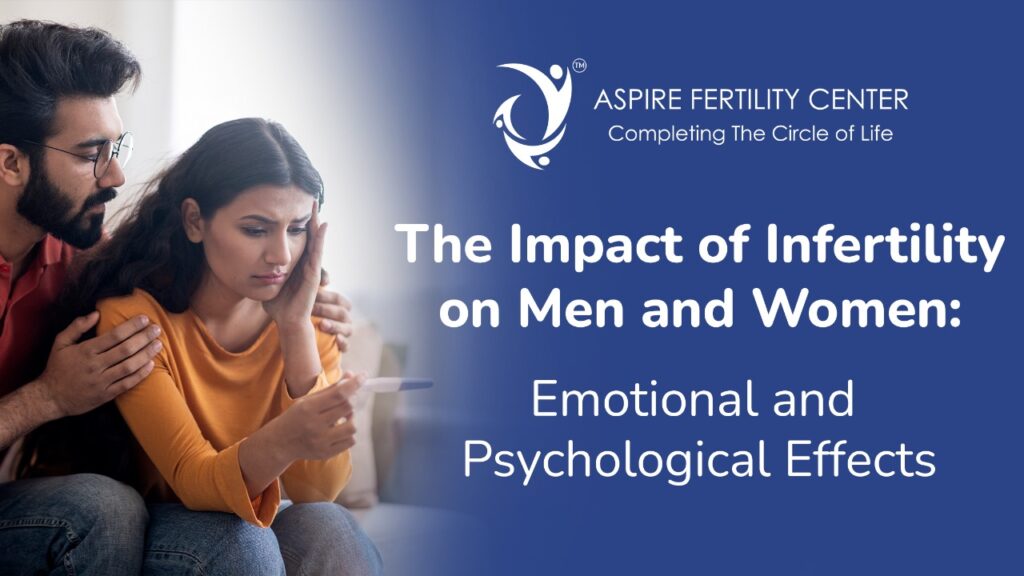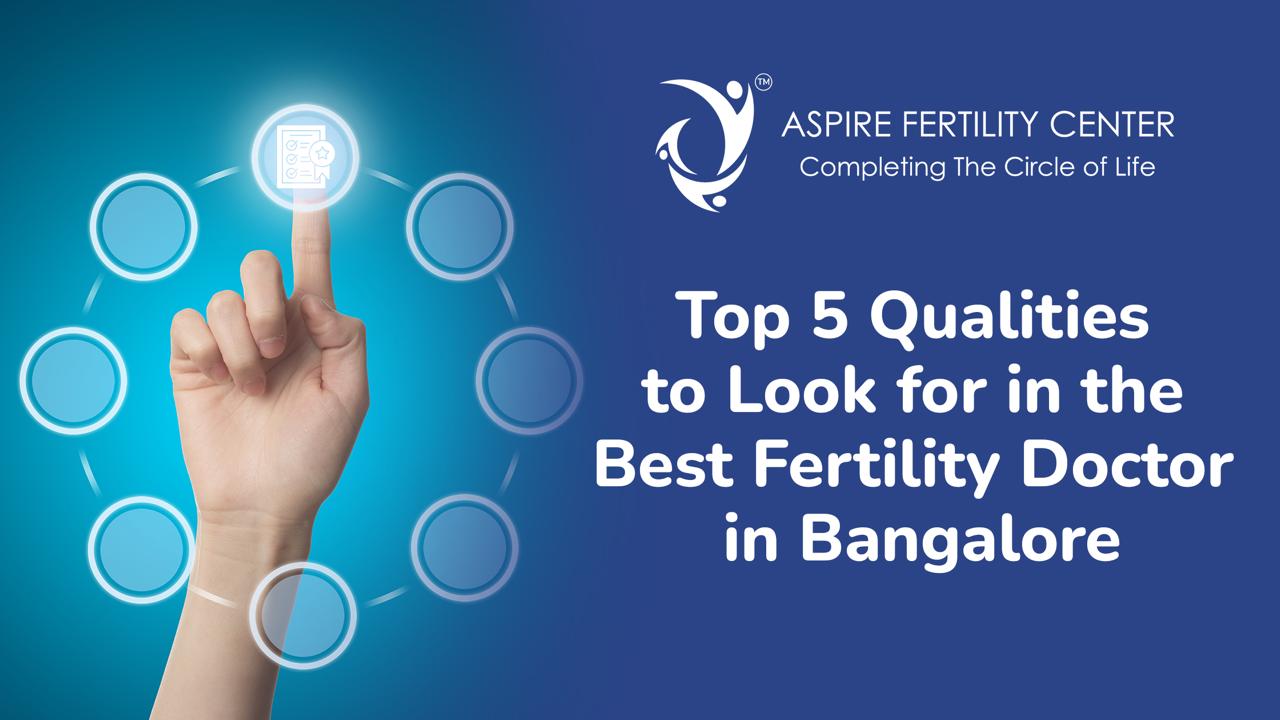
The Impact of Infertility on Men and Women: Emotional and Psychological Effects
Infertility is a deeply personal and often distressing condition that affects millions of couples worldwide. While the physical impact of infertility is well-known, the emotional and psychological effects are equally profound. Understanding these impacts and the importance of compassionate care can significantly improve the experiences of those struggling with infertility.
At Aspire Fertility Center, we take pride in being the best IVF clinic in Bangalore. We offer advanced reproductive technologies and personalized care. Our committed team of fertility specialists understands the challenges that couples encounter with infertility. We are committed to providing comprehensive and compassionate treatment options tailored to your needs. We strive to help you realize your dream of parenthood through our fertility treatments such as IVF, IUI, ICSI and more supported by cutting-edge technology.
Introduction
Infertility is more than a medical condition; it is a journey filled with emotional and psychological challenges. The stigma and misunderstanding surrounding infertility can exacerbate these challenges, making it crucial for both medical professionals and society to extend compassion and support to affected individuals and couples.
What is Infertility?
Infertility is characterized by the inability to conceive after one year of regular, unprotected intercourse. Infertility can stem from problems in either partner or a mix of factors. While the physical causes of infertility can often be identified and treated, the emotional and psychological repercussions require equally careful attention.
The Physical and Emotional Impact of Infertility
Physical Impact
The physical aspects of infertility are often the most apparent. They include hormonal imbalances, issues with reproductive organs, and conditions such as polycystic ovary syndrome (PCOS) or endometriosis. Treatments for infertility, such as in vitro fertilization (IVF) or intracytoplasmic sperm injection (ICSI), can also have physical side effects and require significant time and commitment.
Infertility treatments may involve multiple rounds of hormonal injections, which can lead to discomfort and mood swings. Surgical procedures like egg retrieval and embryo transfer carry risks such as infection or bleeding. For men, treatments may require frequent semen analysis and surgical procedures to address issues like varicocele. The physical demands of infertility treatments can add to the emotional stress already experienced by couples, making comprehensive care essential.
Emotional and Psychological Impact
The emotional toll of infertility can be overwhelming. Many individuals experience feelings of grief, anger, frustration, and even depression in some cases, as they grapple with the challenges of infertility. The uncertainty and disappointment associated with failed attempts to conceive can evoke profound sadness and a sense of loss. Moreover, the rigorous process of fertility treatments, with its highs of hope and lows of disappointment, can amplify anxiety and stress. For couples, infertility can strain relationships and lead to feelings of isolation and guilt. Both partners need to communicate openly, seek support, and prioritize their emotional well-being throughout this challenging process.
Why Does It Matter to Be Compassionate?
Compassion in the context of infertility is not just about empathy; it is a critical component of effective care. When medical professionals, friends, and family members approach individuals struggling with infertility with compassion, they create a supportive environment that acknowledges the emotional complexities of the journey. This compassionate approach helps alleviate feelings of isolation and shame, allowing individuals to feel understood and validated in their experiences. Moreover, compassionate care fosters trust between patients and healthcare providers, which is essential for effective treatment and positive outcomes in fertility interventions.
Beyond the immediate benefits to patient well-being, compassion in infertility care contributes to broader societal change by challenging stigmas and misconceptions surrounding fertility issues. By promoting open and understanding conversations about infertility, compassionate care helps educate communities and reduce the isolation that many individuals facing infertility feel. This inclusive approach encourages support networks to rally around those affected, offering emotional solace and practical assistance. Ultimately, nurturing a culture of compassion empowers individuals to seek help without fear of judgment, ensuring they receive the comprehensive care and support they deserve.
What Couples Go Through: The Emotional Journey
The Emotional Rollercoaster
The journey of infertility is often described as an emotional rollercoaster. Initial excitement and anticipation can quickly turn to disappointment and frustration when conception does not occur. Each menstrual cycle brings a renewed sense of hope and subsequent despair, creating a cycle of emotional highs and lows.
The Impact on Relationships
Infertility can place significant stress on relationships. Couples may experience a range of emotions, including guilt, blame, and resentment. Communication issues can arise, as partners may cope with their feelings in different ways. Couples must seek support and counseling to navigate these challenges together.
Social Isolation and Stigma
The stigma associated with infertility can lead to social isolation. Many individuals feel uncomfortable discussing their struggles with others, fearing judgment or misunderstanding. This sense of isolation can intensify feelings of loneliness and depression. Raising awareness about infertility and promoting open conversations can help reduce this stigma.
The Individual Impact on Men and Women
How Infertility Affects Women
Women often bear the brunt of the physical and emotional impact of infertility. Societal expectations and internalized pressure to conceive can lead to feelings of inadequacy and failure. Women may also face lengthy and demanding medical procedures and treatments further adding to their emotional burden.
How Infertility Affects Men
Men, too, experience significant emotional and psychological effects due to infertility. However, these effects are often underrecognized. Men may feel pressure to be strong and supportive, leading them to suppress their emotions. Feelings of inadequacy, guilt, and frustration are common, and men can also benefit from emotional support and counseling.
Extending Support to Those Affected by Infertility
The Role of Medical Professionals
Medical professionals play a crucial role in providing emotional support to individuals and couples dealing with infertility. Compassionate communication, empathy, and understanding can make a significant difference in the patient experience. Offering counseling services and support groups can also provide additional emotional support.
The Importance of Counseling
Counseling can be an invaluable resource for those struggling with infertility. Professional counselors can help individuals and couples navigate their emotions, improve communication, and develop coping strategies. Counseling can also provide a safe space to express feelings and work through the psychological impact of infertility.
How Friends and Family Can Help
Friends and family members can provide vital support to those dealing with infertility. Simple acts of kindness, such as listening without judgment and offering emotional support, can make a big difference. Being mindful of language and avoiding insensitive comments is also important. Encouraging and supporting couples to seek professional help can be beneficial.
For individuals facing the emotional and psychological effects of infertility, several coping strategies may help ease the burden. Talking to a friend or loved one can offer comfort and reassurance. Practicing mindfulness or meditation can reduce stress and provide moments of calm. Gentle exercise, like yoga, supports mental and physical health alike. If the emotional strain becomes overwhelming, speaking with a counselor or therapist can offer specialized support tailored to navigating these unique challenges.
Conclusion
Infertility is a multifaceted condition that affects individuals physically, emotionally, and psychologically. Recognizing and addressing the emotional and psychological impacts of infertility is essential for providing comprehensive care. Compassion, understanding, and support from medical professionals, friends, and family can help individuals and couples navigate this challenging journey.
At Aspire Fertility Center, we understand the depth of this emotional pain and are dedicated to providing empathetic and personalized care to alleviate the emotional burden of infertility. Our team of experienced fertility specialists is committed to helping you achieve your dream of parenthood through advanced IVF and fertility procedures. Contact us today to learn more about our services and how we can support you on your journey to parenthood.





